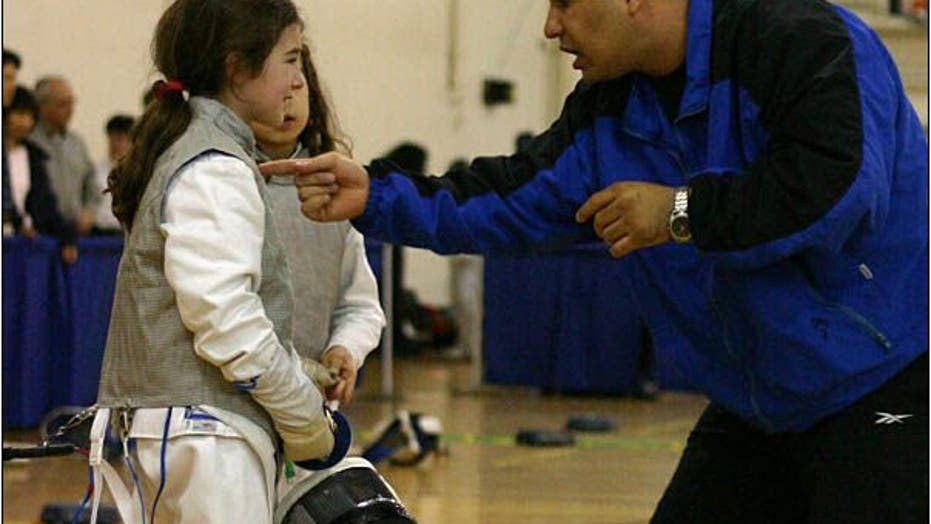BOSTON – Cesar Morales left Cuba on a handmade wooden boat bound to the United States on the evening of August 31, 1994, carrying nothing but the clothes on his back.
“I came to this country with white shorts, a white T-shirt and pink sneakers,” recalls Morales, who in the rush of leaving Cuba couldn’t get sneakers of his size in a different color.
But beyond what could be seen by the naked eye, inside, Morales carried a love for the sport of fencing and physical education, as a teacher and coach in Cuba.
Summary
Cesar Morales arrived in the United States in 1994 on a handmade wooden boat with 13 passengers.
Morales is the first person in the world to start a Fencing Competition for the blind.
Morales has modified some of the rules for the sport even requiring contestants to be blind folded.
Morales had graduated in 1991 with a degree in Physical Education from Cuba's Simon Bolivar School for Physical Education Teachers. He had 11 years of training as a fencer, had participated in national competitions, and had been a fencing instructor at an elementary school for two years.
His divorced mother, a brother, some relatives and friends were among the 13 passengers in the fragile wooden boat that the U.S. Coast Guard rescued offshore four days later.
Morales and his family were sent as refugees to the American military base of Guantanamo Bay, Cuba, for six months and later were transferred to Miami.
Today, Morales, 40, runs the International Fencing Club, a fencing school in West Roxbury, Massachusetts, outside Boston. The school has about 65 students ages six to 66. Some of the students have disabilities or special needs.
In 2010 Morales came up with the idea of what would become the first ever fencing competition among blind contestants in the world.
He had been teaching fencing to blind students at a couple of institutions in Massachusetts since 2006, but he wanted to make the training more competitive.
I would love to bring my kids back to Cuba [so] they could see how much opportunity they have in this country.
As he started researching about fencing competitions for the blind, he found out it had never been done.
Morales modified some of the rules of conventional fencing to make them more suitable for blind contestants. For example, instead of having the opponents start away from each other, they start the match making blade contact to get oriented about where the opponent is.
He also modified the target area to reduce chances of player injuries. Only hits above the waist are counted.
Also, since some blind contestants could have some light perception, they all are blindfolded to take away any such advantage.
Although Morales' original goal was to host “a little competition,” the event was so successful that it attracted local and national media attention.
“Now we would love to do an international competition,” says Morales, who is considering raising funds for that purpose. Fencing has helped blind students to improve their balance, orientation and coordination skills.
The idea of fencing matches among blind contestants has been so powerful that other fencing schools inside and outside the U.S. have contacted Morales to replicate the model. Schools in Arkansas and Oklahoma in the U.S., and schools in Uruguay, Italy and Poland now host fencing competitions for the blind. A documentary about blind fencing competitions is in the making.
But Morales’ journey to become a fencing coach in the U.S. wasn’t easy. He didn’t have any relatives or connections when he arrived to the U.S. and he didn’t even speak English.
After obtaining political asylum, Morales and his family were relocated from Miami to Baton Rouge, Louisiana, where a Catholic charity helped them to find a place to live.
He started working painting houses and at a McDonalds. After six months he got jobs installing cable connections and repairing utility valves. About a year and half later, an acquaintance gave him the idea to move to Boston, since Morales wanted to improve his English and go back to school.
In Boston Morales started taking English as a second language classes at Northeastern University. He remembers studying during the day and working at night as a dishwasher in a hotel.
When one of his teachers discovered that Morales had been a physical education and fencing instructor in Cuba, he gave him an assignment that changed his life.
Morales had to look for schools and clubs in the area that had fencing programs, find the athletic director or the fencing coach, put together his resume and send it to the schools to inquire about openings. Morales got a couple of part-time jobs at the Boston Fencing Club and Brandeis University.
Since then, he has worked as a fencing instructor. In February 2009 he opened his own fencing academy.
Morales married Silvia, one of his classmates at the English program, in 2000. They have two children, Jessica, 11, and Jonathan, 6. He became an American citizen in 2000.
When Morales’ father passed away in 1997, he couldn’t go back to bury him because of the traveling restrictions between the U.S. and Cuba. Still, he hopes one day he will be able to visit the land of his childhood.
“I would love to go back,” says Morales. “I would love to bring my kids back to Cuba [so] they could see how much opportunity they have in this country.”
Follow us on twitter.com/foxnewslatino
Like us at facebook.com/foxnewslatino









































